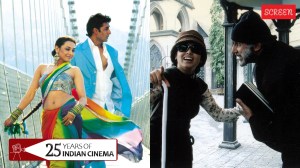Uncalled for: Supreme Court raps UP cops for invoking conversion in rape case
“I don’t want to use the word, the state police is also biased… how can it be? The facts speak for themselves, and you are invoking that Conversion Act for nothing,” Chief Justice of India Sanjiv Khanna said while presiding over a two-judge bench.
 The accused man claimed that he was “ falsely implicated… with a view to cause unnecessary harassment and to victimise him”.
The accused man claimed that he was “ falsely implicated… with a view to cause unnecessary harassment and to victimise him”.The Supreme Court on Thursday rebuked the Uttar Pradesh Police over its handling of a case of alleged gang rape, remarking orally that it was being “biased” and that invoking the conversion law in the case was “uncalled for”.
“I don’t want to use the word, the state police is also biased… how can it be? The facts speak for themselves, and you are invoking that Conversion Act for nothing,” Chief Justice of India Sanjiv Khanna said while presiding over a two-judge bench.
The bench, also comprising Justice Sanjay Kumar, was hearing an appeal challenging the September 5, 2024, Allahabad High Court order denying bail to the man accused of forcibly converting a Hindu woman, who already had a daughter, to Islam and performing ‘nikah’ with her.
Denying him bail, the HC said that “the Constitution confers on each individual the fundamental right to profess, practice and propagate his religion. However, the individual right to freedom of conscience and religion cannot be extended to construe a collective right to proselytise, the right to religious freedom belongs equally to the person converting and the individual sought to be converted.”
While the High Court order mentions the names of the main accused (petitioner), the top court in its February 14 order directed that the names of the petitioner as well as the complainant/victim woman “be suppressed”.
On February 14, 2025, when the court issued notice on the appeal, the petitioner’s counsel had told the bench that “this is a case of a consensual relationship where the parties were known to each other for a long time and the complainant/victim has a child from an earlier relationship/marriage, but wrong allegations are being made to put the petitioner behind bars.” On Thursday, the counsel told the bench that he had been in jail for the last eight months…“for just helping a lady”.
The state of UP, however, said it also involved gang rape charges and sought time to file a counter-affidavit.
The CJI went on to question the application of the anti-conversion Act in the matter. “There is nothing in it….you are not being fair in this, the state is not being fair in this….facts speak for themselves. And invoking the conversion Act? Uncalled for! absolutely uncalled for,” he said.
The bench gave the state five days to file its counter affidavit and five days thereafter to the appellant to file any rejoinder affidavit.
Noting some contradiction in the official report with regard to service of notice to one of the respondents, the court also asked its Registry to examine and verify the factual position. The court will now hear it on April 21, 2025.
As per the prosecution version appearing in the HC order, the woman from West Bengal had stated that she, along with her daughter from an earlier marriage, started living with the accused at Deoband in May 2022. Alleging conversion from Hinduism to Islam, the woman stated that she was forced to put her thumb impression on certain documents in Hindi regarding her ‘nikah’, citing that she couldn’t read or write Hindi. She also alleged that the accused and the co-accused gangraped her. She also alleged conversion of her minor daughter as well.
The accused man claimed that he was “ falsely implicated… with a view to cause unnecessary harassment and to victimise him”.
He said that the woman “had given birth to a baby girl from her earlier corporeal relationship with some other person and was not married to him. The said baby girl from her earlier relationship is a Hindu and has not been converted.” He said that from the inception of the relationship, the woman was aware of his religion and that he was married.
The accused said that he married her “out of her wish, that too, in the presence of the family members of both the parties” and got her “daughter… admitted in the best school of the area…”
He said that “the names of the” woman “and her daughter in the Aadhaar card are according to her own free will and consent” and he “had never compelled them to change their names.”
After considering their submissions, the HC had said the accused “has categorically admitted the fact that he had married the victim as per the Muslim customs”. “There is nothing on record to suggest that any application was moved u/s 8 of the UP Prohibition of Unlawful Conversion of Religion Act, 2021, for conversion of the informant to Islam before the said marriage ceremony as per Muslim rites.”







